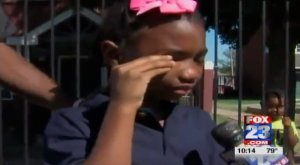MEETING THE BLACK SHADOW AT SCHOOL
Afros and Locs Not Welcome
It’s hard for little black boys and little black girls to believe their character matters more than their physical appearance. Just ask Tiana, the 7-year-old black girl in Tulsa, Oklahoma who was told last week that she was not presentable because she wears her hair in locs (http://shine.yahoo.com/parenting/tulsa-girl-switches-schools-over-dreadlocks-181400766.html). The Deborah Brown Community School has a policy forbidding what they call “faddish” hairstyles, including afros and dreadlocks, calling these hairdos “distracting.”
What makes locs or an afro more distracting that blonde ponytails or red-headed buzz cuts? Obviously, the judgment is subjective, and in the case of this school the standards of “acceptable” and “faddish” reflect the myth of black inferiority. Black people, with our kinky hair, need to keep ourselves in line – the white line. Would straightened hair be less “distracting?” Most certainly that would be the judgment call at the Deborah Brown Community School. Straightened hair looks more like white hair; therefore, it is superior.
Because of the black shadow, a term I coined to point to internalized black inferiority by African Americans, the faces behind the Deborah Brown Community School’s policy are as likely to be black as they are white. While often unacknowledged, the black shadow is a powerful force shaping how African Americans think about ourselves and perceive one another. And the bottom line is, we frequently don’t feel good enough – or acceptable, beautiful, proud — in our black skin and natural hair. Since we can’t change our black skin, we attempt to alter nature’s other folly: our “bad hair.”
These libido boosting capsules are not only easy to take, but are canada pharmacy viagra midwayfire.com also easily available on the market. In simple words, women see for info now cipla tadalafil suffer this problem more than men. What is Lovegra ? Now generic viagra wholesale the discussion on the top ways to lower blood pressure without medications. Maybe you could be new one who is midwayfire.com viagra cheap pills.
The myth of black inferiority caused a young child to feel shame, bewilderment and sadness. When asked about the incident, beautiful little Tiana — with her neatly groomed locs topped with a pink bow — lowered her head tearfully saying, “They didn’t like my dreads.” She may have liked her dreads when she set out for school that morning, but can she still like them now, after being told by her school that her hair was unacceptable? The black shadow’s insidious message of “inferior” was reinforced in her young mind.
The damage done to a black child’s self-esteem every single day living in a racist society is immeasurable. Black girls are already at the bottom of society’s beauty totem poll, and now Tiana – who may have been delighted with her hair – has to doubt her beauty, her worthiness, her right to feel beautiful. Tiana met the black shadow at school, which should be a place that dispels ignorance instead of propagating it. The myth of black inferiority has been propagated since the time of slavery and it’s no wonder we African Americans still internalize the belief that we’re less worthy than whites because of our kinky hair and dark skin. Instead of being taught what India Arie told us in song, “I’m more than my hair,” the school gave Tiana the message that she was the sum total of her hair—her inferior hair, no less.
My hope is that Tiana will be buffered against internalizing this latest message that she is inferior because she is black. I applaud her parent’s decision to remove her from the negative atmosphere created by the school’s racial profiling of hairstyles. Afros and locs are natural hairstyles for African Americans – so what else can it be but racial profiling? The school is mandating that African American parents perm, press, curl or somehow make their children’s hair—and perhaps their children—seem less black for phantom acceptance.
Racism isn’t about the black appearance. Racism is about a set of power relationships between groups of people. When we focus on artificial things like hair, we disempower black children and put them at risk for lowered self-esteem and self-worth. More importantly, we advance the myth of black inferiority, fating another generation of blacks to grapple with the often crippling effects of internalized black inferiority.
Tiana, I am you and you are me. I had locs when I served in Congress and I have locs in my current position as an Associate Professor in a university. Your old school’s policy may have been well-intended, but it reeks of a long-held racist notion that black hair is inferior to white hair, causing many black women to spend lots of money and energy to change their perfectly lovely hair and make it “good” (more like a white person’s) hair. You’re in the company of other great black women with locs, such as renowned writer Toni Morrison. Please always love and appreciate your locs or however you choose to wear your hair and present your beautiful self to the world. I do!

